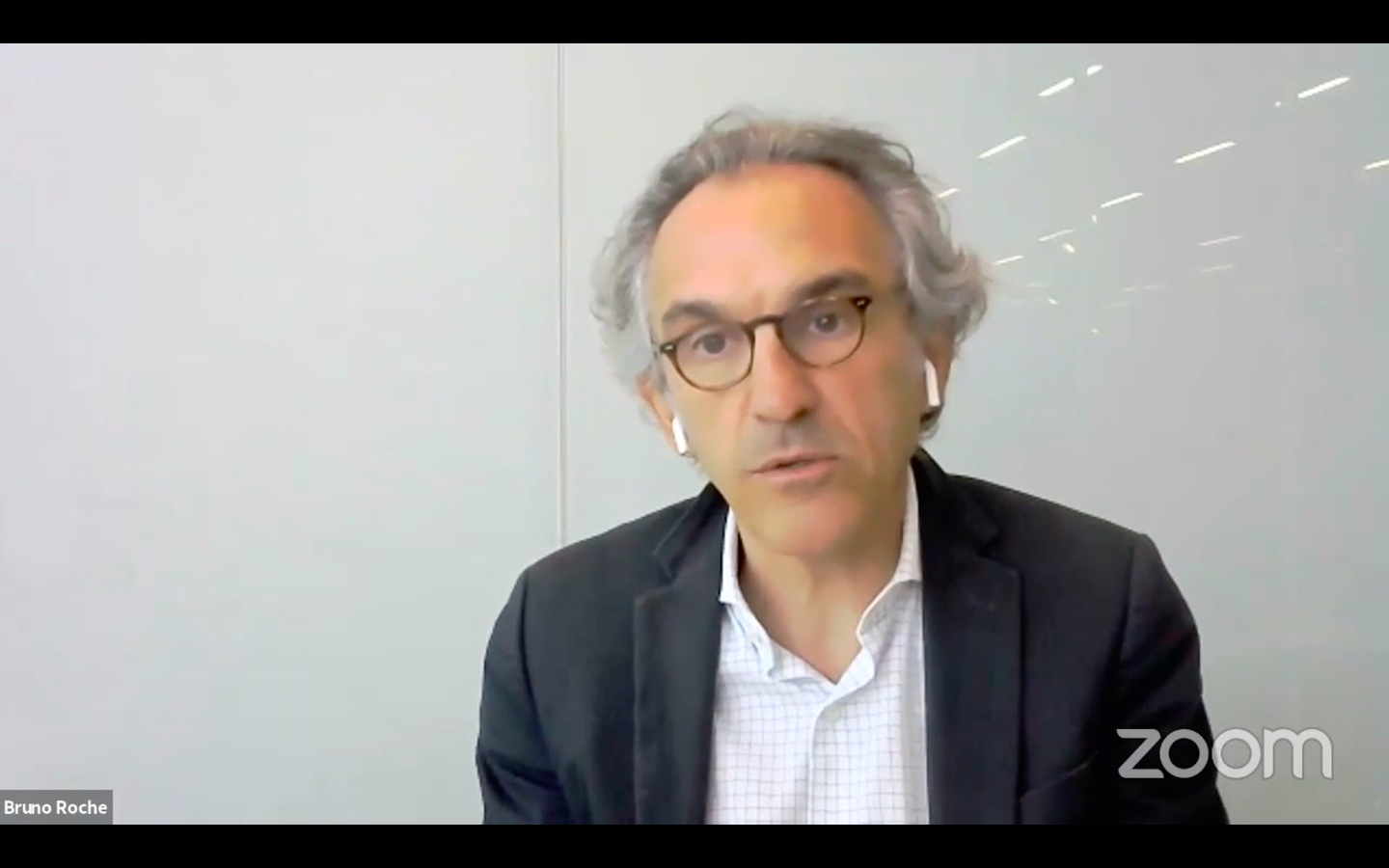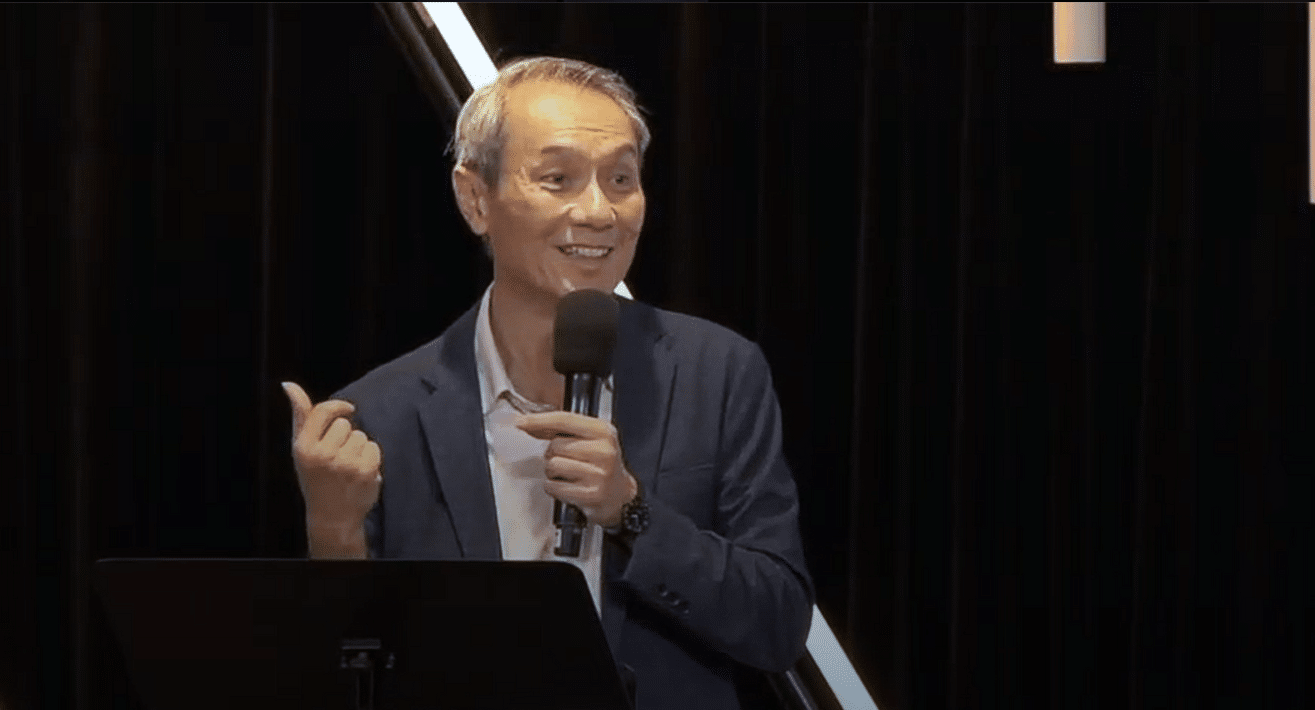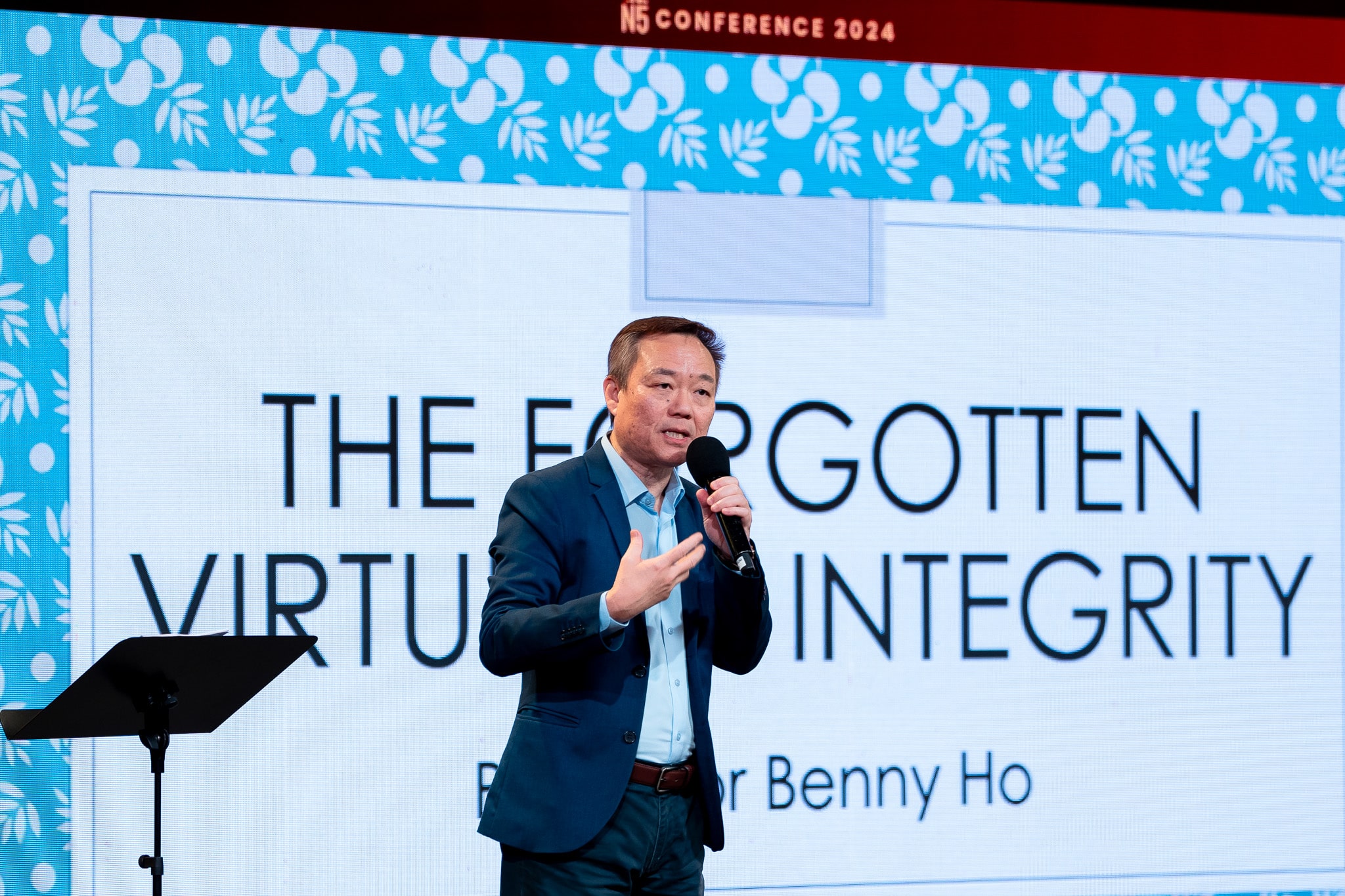Financial capitalism is outdated, says economist who offers alternative for purpose-centric business
In this series on The Gatekeepers Dialogue, Salt&Light interviews leaders who provide a biblical worldview of global issues that will be highlighted at the next World Economic Forum.
by Tan Huey Ying // August 25, 2021, 1:34 pm

In an ideal economic system, each stakeholder – the land that provides (natural capital), the people who work to transform and add value (human and social capital) and the financial capital that ensures liquidity – is remunerated in proportion to what they bring to the system, says economist Bruno Roche. Photo by Renate Vanaga on Unsplash.
Tang ping (躺平) is a movement that is gaining momentum in China.
The phrase, which literally means “lying flat”, extends beyond the immediate idea of doing nothing and has become a statement opposing China’s traditional emphasis on the rat race and capitalistic progress aided by the “996” work culture.
The words “rest” and “self-care” are now in vogue: Drawing work-life boundaries, making time for hobbies, and prioritising mental health to be at least on par with productivity.
Financial capitalism, as we know it, has been tried and found wanting. But it is only recently that a viable – perhaps in a more complete and inclusive form – alternative has been developed.
Not about maximising profit
“What is the right level of profit?”
It’s a question you would expect from a business neophyte, or possibly from anti-competition watchdogs concerned about the growth of mega-corporations like Amazon or Alibaba.
“What is the right – not maximum – level of profit?”
But it came from Mars, Inc – the same privately-held conglomerate that produces the world’s Snickers and M&Ms, Wrigley’s gum, Pedigree and Whiskas pet foods and even Masterfoods kitchen condiments.
In 2007, the board of Mars Inc went against the default approach of pursuing size, profit, and market share and challenged their internal think tank: What level of profit would maximise the company’s performance given the ecosystem it operates in and depends on?
Naturally, this meant posing difficult questions to chief economist Bruno Roche and the team at the Mars Inc think tank, set up in the 1960’s to help Mars stay on the cutting edge of business strategy and management sciences.
When Roche and his team took on the subject of “right profit level”, however, they realised the question had not even been explored by academics.

Bruno Roche, the founder of the Economics of Mutuality, speaks about the model he developed which puts purpose as the primary driver of business strategy. Screenshot of Dialogue session.
“We were surprised,” recalls Roche. “It was a blindspot in academic knowledge.”
Less than two years after they embarked on the discussion, the global financial crisis hit in 2008, driving home the limitations of a society built on financial capitalism.
The imbalanced pursuit of financial capital
“Economics is a discipline that is about managing scarcity. But over the last 50 years, the nature of scarcity has changed quite dramatically,” says Roche, who also points out that most businesses have not changed their approach either.
“Economics is about managing scarcity. But over the last 50 years, the nature of scarcity has changed quite dramatically.”
Financial capitalism was developed to address the particular scarcity of finance, but today, Roche says, it is the opposite. And the context of scarcity is radically different.
Financial capital has become overly abundant while natural, human and social capital are getting scarce.
“Yet, the economic model has not adjusted (to account for this change),” Roche points out. “And that is a major problem.
“Financial capitalism relies very much on size,” Roche explains. “Size matters because that is what gives you power, whether in your relationships with your supplier, your clients and the entire ecosystem.”
Other types of capital available – human, social and natural – cannot be accessed solely through power relationships, but through what Roche and his team have called “reciprocal” or “mutually-beneficial” relationships.
Blueprint of a workable system
“What if we had a model which would reward all the different forms of capital?
“The benefits would not just be limited to one type of stakeholder who owns financial capital, but to all stakeholders which are material to the creation of value in the ecosystem,” says Roche, who was inspired by the ethics of Jubilee, an ancient biblical concept based on the Sabbath as set in the Torah about 3,500 years ago.
“What if we had a model which would reward all the different forms of capital?”
The Sabbath, or Shabbat, details that the Hebrews were to rest one day a week; the land rested one year for every seven; and after every 49 years was the year of the Jubilee, where a “reset” of wealth such as debt and land ownership took place.
“The concept of rest is quite extraordinary,” he reflects. “It is connected to the Sabbath and the fact that work is remunerated with rest, not money – not just of man, but of land and even wealth.”
The land that provides (natural capital), the people who work to transform and add value (human and social capital) and the financial capital that ensures liquidity are essentially the three components of an economic equilibrium, he says.
“In an ideal system, each of these – people, land and capital, in that order – is remunerated in proportion to what they bring to the system.”
Returning to true equilibrium
Eventually, Roche and his team constructed a model which he calls the “economics of mutuality”, where, instead of power relationships, reciprocal relationships between business, society, the environment, and work are built around a purpose-centric business that adopts a fairer and more holistic version of capitalism.
“Purpose has become recently a buzz word is business and finance – often designed to boost corporate reputation and employees engagement.
“In our view, the purpose of business is meant to drive strategy; it is not about maximising profit but to develop profitable and scalable solutions to the problems of society and the environment,” adds Roche. “Not profiting from creating problems.”
The Shabbat was a gift for everyone – not just the Jews.
Holding this definition of purpose can help companies “de-centre” themselves and focus instead on innovating management practices that orchestrate relationships between the various stakeholders that are already present in the ecosystem and thus leveraging the different forms of relevant capital in driving performance as a whole.
It took him and his team just over seven years to develop the theory and measurement indicators alongside Oxford University, before they tested out this model in countries as diverse as the Philippines and Kenya.
With such a “fair” creation of profits, Roche, who is now the founder and leader of the Economics of Mutuality platform, says they expected some form of financial tradeoffs.
What they found, however, surprised them: The bottomline increased across all aspects, across various business models of varying types and sizes. There were quasi no tradeoffs of profit for doing some good for people or planet.
Communities were flourishing; business and profits were growing healthily.
A blessing for all
It’s not at all an “idealogical” project or religious in any way, he stresses.
It’s about understanding the natural laws of economics and business and finding how they fit into a balanced ecosystem. Yet at the same time recognising that it mirrors the principles and values laid out almost 3,500 years ago in the Torah, says Roche.
“The purpose of business is to develop profitable and scalable solutions to problems – not create them.”
The Shabbat was a gift for everyone – not just the Jews, reminds Roche.
He points out that it was also King Solomon who said, about 3,000 years ago, that: “A man may give freely and still his wealth will be increased, while another may hold back more than his right and still come to be in need.”
Likewise, everyone can benefit from the Jubilee approach though a biblical perspective would be better able to understanding the roots and thinking behind it.
“It’s a blessing, a free resource which you can benefit from – that’s how I would like to describe the economics of mutuality,” he states simply.
The word ‘company’ comes from the Latin expression ‘cum panis’ (together breaking bread), says Roche, sharing an insight that his co-author, Oxford University Professor Colin Mayer, had noticed.
“Even in its semantic definition, business is not to maximise profit but to nurture communion.”
But he adds: “For me, it goes back to the first person who used the word ‘company’ to describe a business. He took a religious word – the breaking of the bread is what Jewish families do every week to celebrate Shabbat and it is what Jesus did to institute the Church and the communion amongst his disciples – and used it as the simplest and most profound symbol of what unites people with God.”
“You can’t find a more profound concept than that. And that’s the word we use to describe business. We should never forget that.”
Q&A: How do I apply this principle of mutual blessing and communion to my organisation?
While applying the model of the economics of mutuality model may not be immediately possible to every business due to the amount of change required, Bruno Roche shares how believers can start taking steps towards building a fairer and more equitable form of capitalism in their businesses.
1. Decide to make purpose the goal
Make the bold decision that the main goal of business is not to maximise profit but to pursue a purpose.
It’s as simple as that, but it’s difficult. Because many people do business with the sole purpose of making money.
You have to decide: My company is not the centre of the world. It is the purpose that is at the centre and my company is just one stakeholder out of many in that higher purpose of solving problems in society.
You don’t need to go to an MBA class to do that, it just starts with how you see the world.
Of course, you would want to do it profitably and at scale. But it is a different perspective.
When you do that, you are no longer self-centred. You are also in the process of understanding that there are many stakeholders connected – and are material – to the purpose that you are pursuing.
And maybe, actually, your business is there to orchestrate the relationships between the other stakeholders. And to help solve the problems of others.
If you look at some of the case studies we’ve done, this is actually a very, very effective business strategy.
Companies that are moving from command-and-control (which requires power relationships), into an orchestrative mode of developing relationships are actually much more powerful and successful. Not only in understanding the ecosystem and shaping it but also taking their fair share of the value that is being created.
It’s conceptually very simple, but it goes against a lot of business teachings. There is an element of un-learning, to learn new things.
You don’t need to go to an MBA class to do that, it just starts with how you see the world.
2. Move together, with God and others
There’s an African proverb that says: “If you want to go fast, go alone. If you want to go far, go together.” It’s important for any leader who wants change to assemble a group of people who can reflect, pray and get guidance together.
It’s a shift of mindset to manage your company as an institution to nurture communion first, make profit second.
The Apostle Paul (or Saul of Tarsus, as he was previously known as) wrote that “for the love of money is a source of all kinds of evil”.
And, sadly, the business world has been almost solely driven by this attitude of greed and love for money which has been a source of tremendous financial value creation for a minority but with significant environmental degradation and an alarming rise in inequality.
So when you propose a different way of doing business, you’re going to face a lot of opposition because most business people assume that success, power and influence would primarily come from financial success.
But as a business leader, if you give up on this, you can look for a higher economic order that is not limited to maximising profits and shareholder value.
It’s a shift of mindset to manage your company as an institution to nurture communion first, make profit second.
The Gatekeepers Dialogue, organised by Gatekeepers (Singapore), brings together Christian leaders across disciplines from different nations as an ekklesia to discern, share and address contemporary Environment, Social, and Governance (ESG) issues from a Biblical context.
MORE FROM THE GATEKEEPERS DIALOGUE:
“The ordinary man, you and I, can make a difference”: Retired Judge Richard Magnus
We are an independent, non-profit organisation that relies on the generosity of our readers, such as yourself, to continue serving the kingdom. Every dollar donated goes directly back into our editorial coverage.
Would you consider partnering with us in our kingdom work by supporting us financially, either as a one-off donation, or a recurring pledge?
Support Salt&Light


